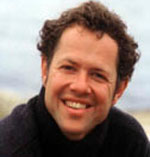
Marine Ecosystems Severely Threatened by Overfishing: Exclusive Interview with Marine Biologist Dr. Boris Worm
 Tuesday, March 10, 2009 Tuesday, March 10, 2009by Mike Adams, the Health Ranger Editor of NaturalNews.com (See all articles...) Tags: overfishing, Boris Worm, Dr. Boris Worm |
Most Viewed Articles
Today
Week
Month
Year
- Newly released JFK files reveal Pentagon's role in creating Lyme disease and covid in the same lab
- Dr. Suzanne Humphries makes bombshell appearance on Joe Rogan podcast, exposing vaccine industry deception back to POLIOMYELITIS
- L.A.'s rebuilding nightmare: Only 4 permits issued after fire destroys 6,000 homes
- Discovery of vast underground city beneath Giza pyramids challenges human history
- Black cumin seed oil emerges as a powerful ally against breast cancer and chronic inflammation
- “Independent” anti-Russia outlet MEDUZA faces COLLAPSE as US funding dries up
- Catastrophic 7.7 earthquake devastates Myanmar and Thailand; death toll could reach 100,000
- The hidden battle in your glass: How A1 and A2 milk could shape your health
- AI breakthrough slashes celiac disease diagnosis time from months to minutes
- BPA: The hidden hormone disruptor sabotaging your health - and how to fight back
- Sugar-free deception: Artificial sweeteners hijack hunger signals, fuel obesity epidemic, study warns
- Europe braces for WAR as EU urges citizens to STOCKPILE FOOD, in latest provocations with Russia
- Putin vows to 'finish off' Ukraine, accuses West of prolonging the war
- Thomas Massie’s Dual Loyalty Disclosure Act aims to restore American sovereignty by cracking down on foreign influence in Congress
- Aluminum pollution: A silent threat to human health
- Tesla owners under siege: Road rage, vandalism and political backlash fuel fear among drivers nationwide
- Chaos in Amsterdam: Five injured in broad daylight knife attack near Dam Square
- "Feel G.O.O.D. Gut Health Program" on BrightU: Dr. Basima Williams introduces the Feel-Good Plate Method
- Newly released JFK files reveal Pentagon's role in creating Lyme disease and covid in the same lab
- Analysis: The coming economic collapse, a mass uprising and Trump's three secret weapons to halt the growing revolt
- Festive flavors: The sweet history, nutritional profile and health benefits of pecan pie
- Elon Musk: Aliens could be here on Earth RIGHT NOW
- Trump reverses course on Gaza plan, says “nobody is expelling Palestinians”
- Big Pharma's $8 Billion bribery scheme exposed: how doctors are pushed to prescribe junk science, not heal
- Boys are back in town: Trump’s patriotic alpha crew takes the wheel while toxic females ride in the backseat
- Reclaim your health: How midlife exercise reverses years of inactivity
- A lack of integrity in Academia: Harvard professor found GUILTY of fraudulent research to promote CRT theory
- Survival 101: Effective EMF blocking techniques
- EPA advisor admits the agency is funneling billions to climate groups ahead of Trump’s return to White House
- Dr. Mike Yeadon releases 15-minute testimony - WATCH - about genocidal intent of COVID “vaccines”
- 5 Simple steps to boost your brainpower: How to strengthen executive function in a distracted world
- Florida takes a stand: DeSantis proposes permanent ban on mRNA vaccine mandates
- Sugarcane extract superior to cholesterol-lowering drugs?
- Mike Adams Sermon 66: God will DESTROY ISRAEL for its wickedness
- Pilots report mysterious lights 'moving at extreme speeds' across Oregon skies
- Space war brewing? Russia threatens to destroy Starlink satellites
- EPA advisor admits the agency is funneling billions to climate groups ahead of Trump’s return to White House
- California's social media censorship law struck down: A victory for free speech or a threat to online safety?
- The Health Ranger releases “Vaccine Zombie” song and music video, using AI-animated zombies for the music video
- Dr. Mike Yeadon releases 15-minute testimony - WATCH - about genocidal intent of COVID “vaccines”
- The pandemic as a tool for INDOCTRINATION: Understanding “The Indoctrinated Brain” by Dr. Michael Nehls
- Newly released JFK files reveal Pentagon's role in creating Lyme disease and covid in the same lab
- Florida takes a stand: DeSantis proposes permanent ban on mRNA vaccine mandates
- Mike Adams releases country western hit single: Goin’ Back in Time is Comin’ Home
- Mike Adams releases music poetry sensation: A Child of God
- “Why we influenced the 2020 elections”: Facebook files reveal the coordinated effort to bury the Hunter Biden laptop story
- Unpacking the Lies That We’ve Been Fed – new song and music video released by Mike Adams, the Health Ranger
- RFK Jr. clears key hurdle: Sen. Susan Collins backs controversial HHS nominee, signaling a new era for health policy
- Mike Adams releases new song and music video: Nothing More Disgusting Than a Globalist
- Michigan sheriff announces criminal investigation into 2020 election crimes, Dominion Voting Systems
- Israeli soldiers accused of even more torture and abuse in the West Bank
- Migrants are taking advantage of recent hurricanes to scam residents and loot their homes
- House Intelligence Committee calls for the ARREST and PROSECUTION of Dr. Anthony Fauci
- Rep. Nancy Mace introduces bill to ban biological males from female facilities on federal property
- Red Cross issues warning to stop blood plasma donations from vaccinated people
- Scientists confirm: GENIUS brain function can be spontaneously unleashed in humans without any apparent cause
- EPA advisor admits the agency is funneling billions to climate groups ahead of Trump’s return to White House
- HYSSOP: What research reveals about the health benefits of this ancient holy herb
- Two containers with completed ballots fall out of truck in Florida
- Fully vaccinated about to see “tsunami” of illness and death, warns virologist
- Global leaders unite to clamp down on “misinformation” with UN-backed Cascais Declaration
- BREAKING: 2025 NDAA authorizes mandatory military draft of WOMEN across America… as Pentagon pursues global NUCLEAR war with both Russia and China at the same time
- Michael Yon warns of a ZIONIST TAKEOVER in Trump’s second administration
- BOMBSHELL: DNA testing kits are a SCAM to develop ethnic-specific bioweapons
- Ozempic and Wegovy weight loss drugs are injectable LIZARD VENOM PEPTIDES that may unleash a devastating wave of organ failure… side effects align with symptoms of SNAKE BITES
- Israeli soldiers accused of even more torture and abuse in the West Bank
- These 13 countries just signed an agreement to engineer a global FAMINE by destroying food supply
- NASA admits that climate change occurs because of changes in Earth’s solar orbit, and NOT because of SUVs and fossil fuels
- RFK Jr. clears key hurdle: Sen. Susan Collins backs controversial HHS nominee, signaling a new era for health policy
- Sermon 30: How Jesus reveals Caesar’s FAKE CURRENCY and FALSE AUTHORITY
- Coriander seeds: Ancient medicine backed by modern science
- Arizona officials claim Maricopa County needs 10-13 days to tabulate results of the election
(NaturalNews) Every corner of the Earth's oceans has been impacted by commercial fishing, and many commercial fisheries are now in a state of collapse, warns Dr. Boris Worm, a prominent marine biologist and primary author of a peer-reviewed paper published in Science entitled, Impacts of Biodiversity Loss on Ocean Ecosystem Services (http://www.sciencemag.org/cgi/content/abstra...) (Science, November 2006: Vol. 314. no. 5800, pp. 787 - 790).
The plundering of the world's seafood populations is not sustainable, warns Dr. Worm in this exclusive interview with NaturalNews editor Mike Adams. The rapid depletion of important predator species like sharks -- combined with the loss of slow-growing marine mammals such as whales -- is causing a dangerous imbalance in the sustainability of ocean life.
From the commercial harvesting of krill to the cruel practice of "finning" sharks, humans are impacting marine ecosystems in a short-sighted and dangerous way, warns Dr. Worm.
The full interview (approx. 45 minutes) is available for downloading right now from NaturalNews: https://www.naturalnews.com/Index-Podcasts.ht... (Health Ranger Show #73).
Not all the news about commercial fishing of the world's oceans is bad news, however. Dr. Worm points to some important success stories of sustainable commercial fishing operations (including certain aquaculture farms), and he urges consumers to inform themselves about the origins of seafood so that they might make better decisions when buying seafood at the grocery store or ordering it at restaurants.
At the same time, Dr. Worm warns listeners that unless these success stories are embraced and applied across the board, much of the seafood humans now catch and consume could be virtually nonexistent by the year 2050.
• Human activity is now dominating the circumstances and destruction of many marine species.
• A decline of 90% of the population of many marine species has been documented.
• Fisheries around the world are now in serious trouble; changes are needed quickly to reverse the decline of marine species.
• There are ways of solving the problem, and there are success stories in sustainable fishing. We must learn from these success stories and apply them globally if we hope to prevent further declines in the populations of marine animals.
• Global fishing could be virtually wiped out by 2050 if drastic changes are not made in sustainable fishing practices.
• Ocean ecosystems have reached a limit where humans are taking too much out while dumping too much waste into the oceans.
• Overfishing is the largest single impact on marine ecosystems today.
• Overfishing is now spreading from coastal areas to the deep sea.
• There is no ocean on the planet that has not been impacted by commercial fishing.
• The fishing of sharks is a great threat to marine ecosystems. The practice of "finning" sharks is devastating shark populations and ultimately upsetting the natural balance of the web of life in our world's oceans.
• Shark protection groups you should know about include: Shark Alliance (www.SharkAlliance.org), Longitude 181 (www.Longitude181.com) (French), Oceana (www.Oceana.org), The Ocean Conservancy (www.OceanConservancy.org), Greenpeace (www.Greenpeace.org).
• The Antarctic ecosystem has been changed greatly by commercial fishing and the removal of whales.
• Consumer Choice cards are available at the Monterey Bay Aquarium (www.MontereyBayAquarium.org) that teach consumers which fish are unsustainable (such as Chilean Sea Bass or Orange Roughy) and should therefore be avoided by consumers.
• Commercial fishing operations invent new names of fish to replace traditional names that aren't very marketable. The "Slime Head Fish" was re-named to "Orange Roughy" to make it more palatable to consumers, for example.
• In the EU, ocean products must be properly labeled with their true name (scientific name) and place of origin. In the U.S., no such labeling laws currently exist.
• The Marine Stewardship Council certifies the eco-sustainability of fisheries. It is a globally-recognized and well-trusted eco-certification authority. (www.MSC.org)
• Commercial fishing of krill (a "foundation species") is "very risky" to the delicate marine ecosystems of the Antarctic and can "compromise the entire ecosystem."
• "There is good evidence that recent declines in the number of penguins around Antarctica is linked to the diminishing supply of krill," says Dr. Boris Worm.
• It is absolutely true that there are millions of tons of floating plastic debris in the Pacific ocean which is resulting in the deaths of hundreds of thousands of birds and marine animals each year.
• "There is no doubt that the amount of trash in the ocean is a major contributor to mortality in mammals, fishes and seabirds."
• It's true that cruise ships still dump many types of garbage directly into the ocean. Dumping plastic is banned, but military vessels are exempt from such provisions and may regularly dump plastics directly into the ocean.
• There is currently virtually no enforcement of dumping restrictions on any ocean-faring vessels. Essentially, any ship can dump practically anything directly into the ocean.
• When aquaculture farming uses wild-caught fish to feed farmed predatory fish, it is very wasteful and damaging to ocean ecosystems. But when aquaculture farming is pursued with marine species that feed on plants or phytoplankton, it is the most sustainable, ideal way to produce seafood.
• Tuna aquaculture farming is extremely inefficient, running at a 10-to-1 ratio (ten pounds of fish fed to the tuna for every pound of tuna produced).
• Tilapia is typically produced in an environmentally-friendly way, using mostly plants as the feed source.
• Aquaculture mussels are a sustainable choice, as they are not taking resources away from the marine ecosystems.
• Fish that are fed other fish in aquaculture farms tend to function as pollutant concentrators, collecting heavy metals and other toxic chemicals in their flesh.
• Want to protect the marine ecosystem? Educate yourself about sustainable sources of seafood and change what you buy at the grocery store or order at a restaurant to avoid buying unsustainably-harvested seafood.
• A good website for royalty-free ocean conservation photos is MarinePhotoBank.org
• Another great website for learning about sustainable seafood is www.SeafoodChoices.org
• Scientists have a very important role in making decisions about creating a more abundant, sustainable future. Scientists need to be allowed to practice good science and engage in public conversations about what they're finding, without political censorship.
If you represent a group such as Oceana (or a similarly-focused non-profit organization), please contact NaturalNews through our feedback form at: www.NaturalNews.com/feedback.html
The only requirements for receiving free advertising space on NaturalNews is that you formally request the donated ad space on your organization's letterhead and you provide a 300 x 250 jpeg ad image that we may post. Contact us to get this started.
NaturalNews is dedicated to protecting all animals on our planet, including marine animals. This $5,000 donation of advertising space is just the beginning of our efforts to promote the knowledge that is necessary for humans to live in balance with a sustainable marine ecosystem.
Please also consider making a tax-deductible contribution to ocean conservancy groups of your choice. And listen to the full interview with Dr. Boris Worm to learn why ocean conservation is so important: https://www.naturalnews.com/Index-Podcasts.ht...
Here are some additional facts about Dr. Boris Worm:
Professor of Marine Biology
Dalhousie University, Halifax, Novascotia
http://biology.dal.ca/us/f/worm/worm.html
Author of: Impacts of Biodiversity Loss on Ocean Ecosystem Services
http://www.sciencemag.org/cgi/content/abstra...
Science 3 November 2006: Vol. 314. no. 5800, pp. 787 - 790
Abstract:
Human-dominated marine ecosystems are experiencing accelerating loss of populations and species, with largely unknown consequences. We analyzed local experiments, long-term regional time series, and global fisheries data to test how biodiversity loss affects marine ecosystem services across temporal and spatial scales. Overall, rates of resource collapse increased and recovery potential, stability, and water quality decreased exponentially with declining diversity. Restoration of biodiversity, in contrast, increased productivity fourfold and decreased variability by 21%, on average. We conclude that marine biodiversity loss is increasingly impairing the ocean's capacity to provide food, maintain water quality, and recover from perturbations. Yet available data suggest that at this point, these trends are still reversible.
Authors of the paper:
Boris Worm,1 Edward B. Barbier,2 Nicola Beaumont,3 J. Emmett Duffy,4 Carl Folke,5,6 Benjamin S. Halpern,7 Jeremy B. C. Jackson,8,9 Heike K. Lotze,1 Fiorenza Micheli,10 Stephen R. Palumbi,10 Enric Sala,8 Kimberley A. Selkoe,7 John J. Stachowicz,11 Reg Watson12
1 Department of Biology, Dalhousie University, Halifax, NS, Canada B3H 4J1.
2 Department of Economics and Finance, University of Wyoming, Laramie, WY 82071, USA.
3 Plymouth Marine Laboratory, Plymouth PL1 3DH, UK.
4 Virginia Institute of Marine Sciences, Gloucester Point, VA 23062–1346, USA.
5 Department of Systems Ecology, Stockholm University, Stockholm, SE-106 91 Sweden.
6 Beijer International Institute of Ecological Economics, Royal Swedish Academy of Sciences, SE-104 05, Stockholm, Sweden.
7 National Center for Ecological Analysis and Synthesis, Santa Barbara, CA 93101, USA.
8 Center for Marine Biodiversity and Conservation, Scripps Institution of Oceanography, La Jolla, CA 92093–0202, USA.
9 Smithsonian Tropical Research Institute, Box 2072, Balboa, Republic of Panama.
10 Hopkins Marine Station, Stanford University, Pacific Grove, CA 93950, USA.
11 Section of Evolution and Ecology, University of California, Davis, CA 95616, USA.
12 Fisheries Centre, University of British Columbia, Vancouver, BC, Canada V6T 1Z4.
The plundering of the world's seafood populations is not sustainable, warns Dr. Worm in this exclusive interview with NaturalNews editor Mike Adams. The rapid depletion of important predator species like sharks -- combined with the loss of slow-growing marine mammals such as whales -- is causing a dangerous imbalance in the sustainability of ocean life.
From the commercial harvesting of krill to the cruel practice of "finning" sharks, humans are impacting marine ecosystems in a short-sighted and dangerous way, warns Dr. Worm.
The full interview (approx. 45 minutes) is available for downloading right now from NaturalNews: https://www.naturalnews.com/Index-Podcasts.ht... (Health Ranger Show #73).
Not all the news about commercial fishing of the world's oceans is bad news, however. Dr. Worm points to some important success stories of sustainable commercial fishing operations (including certain aquaculture farms), and he urges consumers to inform themselves about the origins of seafood so that they might make better decisions when buying seafood at the grocery store or ordering it at restaurants.
At the same time, Dr. Worm warns listeners that unless these success stories are embraced and applied across the board, much of the seafood humans now catch and consume could be virtually nonexistent by the year 2050.
Important words from Dr. Boris Worm
Here is a quick summary of the most important points heard in this interview with Dr. Worm:• Human activity is now dominating the circumstances and destruction of many marine species.
• A decline of 90% of the population of many marine species has been documented.
• Fisheries around the world are now in serious trouble; changes are needed quickly to reverse the decline of marine species.
• There are ways of solving the problem, and there are success stories in sustainable fishing. We must learn from these success stories and apply them globally if we hope to prevent further declines in the populations of marine animals.
• Global fishing could be virtually wiped out by 2050 if drastic changes are not made in sustainable fishing practices.
• Ocean ecosystems have reached a limit where humans are taking too much out while dumping too much waste into the oceans.
• Overfishing is the largest single impact on marine ecosystems today.
• Overfishing is now spreading from coastal areas to the deep sea.
• There is no ocean on the planet that has not been impacted by commercial fishing.
• The fishing of sharks is a great threat to marine ecosystems. The practice of "finning" sharks is devastating shark populations and ultimately upsetting the natural balance of the web of life in our world's oceans.
• Shark protection groups you should know about include: Shark Alliance (www.SharkAlliance.org), Longitude 181 (www.Longitude181.com) (French), Oceana (www.Oceana.org), The Ocean Conservancy (www.OceanConservancy.org), Greenpeace (www.Greenpeace.org).
• The Antarctic ecosystem has been changed greatly by commercial fishing and the removal of whales.
• Consumer Choice cards are available at the Monterey Bay Aquarium (www.MontereyBayAquarium.org) that teach consumers which fish are unsustainable (such as Chilean Sea Bass or Orange Roughy) and should therefore be avoided by consumers.
• Commercial fishing operations invent new names of fish to replace traditional names that aren't very marketable. The "Slime Head Fish" was re-named to "Orange Roughy" to make it more palatable to consumers, for example.
• In the EU, ocean products must be properly labeled with their true name (scientific name) and place of origin. In the U.S., no such labeling laws currently exist.
• The Marine Stewardship Council certifies the eco-sustainability of fisheries. It is a globally-recognized and well-trusted eco-certification authority. (www.MSC.org)
• Commercial fishing of krill (a "foundation species") is "very risky" to the delicate marine ecosystems of the Antarctic and can "compromise the entire ecosystem."
• "There is good evidence that recent declines in the number of penguins around Antarctica is linked to the diminishing supply of krill," says Dr. Boris Worm.
• It is absolutely true that there are millions of tons of floating plastic debris in the Pacific ocean which is resulting in the deaths of hundreds of thousands of birds and marine animals each year.
• "There is no doubt that the amount of trash in the ocean is a major contributor to mortality in mammals, fishes and seabirds."
• It's true that cruise ships still dump many types of garbage directly into the ocean. Dumping plastic is banned, but military vessels are exempt from such provisions and may regularly dump plastics directly into the ocean.
• There is currently virtually no enforcement of dumping restrictions on any ocean-faring vessels. Essentially, any ship can dump practically anything directly into the ocean.
• When aquaculture farming uses wild-caught fish to feed farmed predatory fish, it is very wasteful and damaging to ocean ecosystems. But when aquaculture farming is pursued with marine species that feed on plants or phytoplankton, it is the most sustainable, ideal way to produce seafood.
• Tuna aquaculture farming is extremely inefficient, running at a 10-to-1 ratio (ten pounds of fish fed to the tuna for every pound of tuna produced).
• Tilapia is typically produced in an environmentally-friendly way, using mostly plants as the feed source.
• Aquaculture mussels are a sustainable choice, as they are not taking resources away from the marine ecosystems.
• Fish that are fed other fish in aquaculture farms tend to function as pollutant concentrators, collecting heavy metals and other toxic chemicals in their flesh.
• Want to protect the marine ecosystem? Educate yourself about sustainable sources of seafood and change what you buy at the grocery store or order at a restaurant to avoid buying unsustainably-harvested seafood.
• A good website for royalty-free ocean conservation photos is MarinePhotoBank.org
• Another great website for learning about sustainable seafood is www.SeafoodChoices.org
• Scientists have a very important role in making decisions about creating a more abundant, sustainable future. Scientists need to be allowed to practice good science and engage in public conversations about what they're finding, without political censorship.
NaturalNews Donates $5,000 in Advertising to Ocean Conservancy Groups
I was so inspired by this interview with Dr. Boris Worm that NaturalNews has pledged a donation of $5,000 in advertising space to non-profit ocean conservancy groups.If you represent a group such as Oceana (or a similarly-focused non-profit organization), please contact NaturalNews through our feedback form at: www.NaturalNews.com/feedback.html
The only requirements for receiving free advertising space on NaturalNews is that you formally request the donated ad space on your organization's letterhead and you provide a 300 x 250 jpeg ad image that we may post. Contact us to get this started.
NaturalNews is dedicated to protecting all animals on our planet, including marine animals. This $5,000 donation of advertising space is just the beginning of our efforts to promote the knowledge that is necessary for humans to live in balance with a sustainable marine ecosystem.
Please also consider making a tax-deductible contribution to ocean conservancy groups of your choice. And listen to the full interview with Dr. Boris Worm to learn why ocean conservation is so important: https://www.naturalnews.com/Index-Podcasts.ht...
Additional information about Dr. Boris Worm
In my view, Dr. Boris Worm is among the most important scientists now reporting the truth about the alarming impacts of commercial fishing in our world's oceans. His work deserves your attention and your support. Currently, Dr. Worm does not have a blog site or a book, but he told me he may consider such things in the future if there is enough interest from the public. If he does start a blog site, we will announce it on NaturalNews.Here are some additional facts about Dr. Boris Worm:
Professor of Marine Biology
Dalhousie University, Halifax, Novascotia
http://biology.dal.ca/us/f/worm/worm.html
Author of: Impacts of Biodiversity Loss on Ocean Ecosystem Services
http://www.sciencemag.org/cgi/content/abstra...
Science 3 November 2006: Vol. 314. no. 5800, pp. 787 - 790
Abstract:
Human-dominated marine ecosystems are experiencing accelerating loss of populations and species, with largely unknown consequences. We analyzed local experiments, long-term regional time series, and global fisheries data to test how biodiversity loss affects marine ecosystem services across temporal and spatial scales. Overall, rates of resource collapse increased and recovery potential, stability, and water quality decreased exponentially with declining diversity. Restoration of biodiversity, in contrast, increased productivity fourfold and decreased variability by 21%, on average. We conclude that marine biodiversity loss is increasingly impairing the ocean's capacity to provide food, maintain water quality, and recover from perturbations. Yet available data suggest that at this point, these trends are still reversible.
Authors of the paper:
Boris Worm,1 Edward B. Barbier,2 Nicola Beaumont,3 J. Emmett Duffy,4 Carl Folke,5,6 Benjamin S. Halpern,7 Jeremy B. C. Jackson,8,9 Heike K. Lotze,1 Fiorenza Micheli,10 Stephen R. Palumbi,10 Enric Sala,8 Kimberley A. Selkoe,7 John J. Stachowicz,11 Reg Watson12
1 Department of Biology, Dalhousie University, Halifax, NS, Canada B3H 4J1.
2 Department of Economics and Finance, University of Wyoming, Laramie, WY 82071, USA.
3 Plymouth Marine Laboratory, Plymouth PL1 3DH, UK.
4 Virginia Institute of Marine Sciences, Gloucester Point, VA 23062–1346, USA.
5 Department of Systems Ecology, Stockholm University, Stockholm, SE-106 91 Sweden.
6 Beijer International Institute of Ecological Economics, Royal Swedish Academy of Sciences, SE-104 05, Stockholm, Sweden.
7 National Center for Ecological Analysis and Synthesis, Santa Barbara, CA 93101, USA.
8 Center for Marine Biodiversity and Conservation, Scripps Institution of Oceanography, La Jolla, CA 92093–0202, USA.
9 Smithsonian Tropical Research Institute, Box 2072, Balboa, Republic of Panama.
10 Hopkins Marine Station, Stanford University, Pacific Grove, CA 93950, USA.
11 Section of Evolution and Ecology, University of California, Davis, CA 95616, USA.
12 Fisheries Centre, University of British Columbia, Vancouver, BC, Canada V6T 1Z4.
Follow real-time breaking news headlines on
Overfishing at FETCH.news
Overfishing at FETCH.news
Receive Our Free Email Newsletter
Get independent news alerts on natural cures, food lab tests, cannabis medicine, science, robotics, drones, privacy and more.
 About the author:Mike Adams (aka the "Health Ranger") is a best selling author (#1 best selling science book on Amazon.com) and a globally recognized scientific researcher in clean foods. He serves as the founding editor of NaturalNews.com and the lab science director of an internationally accredited (ISO 17025) analytical laboratory known as CWC Labs. There, he was awarded a Certificate of Excellence for achieving extremely high accuracy in the analysis of toxic elements in unknown water samples using ICP-MS instrumentation. Adams is also highly proficient in running liquid chromatography, ion chromatography and mass spectrometry time-of-flight analytical instrumentation.
About the author:Mike Adams (aka the "Health Ranger") is a best selling author (#1 best selling science book on Amazon.com) and a globally recognized scientific researcher in clean foods. He serves as the founding editor of NaturalNews.com and the lab science director of an internationally accredited (ISO 17025) analytical laboratory known as CWC Labs. There, he was awarded a Certificate of Excellence for achieving extremely high accuracy in the analysis of toxic elements in unknown water samples using ICP-MS instrumentation. Adams is also highly proficient in running liquid chromatography, ion chromatography and mass spectrometry time-of-flight analytical instrumentation.
Adams is a person of color whose ancestors include Africans and Native American Indians. He's also of Native American heritage, which he credits as inspiring his "Health Ranger" passion for protecting life and nature against the destruction caused by chemicals, heavy metals and other forms of pollution.
Adams is the founder and publisher of the open source science journal Natural Science Journal, the author of numerous peer-reviewed science papers published by the journal, and the author of the world's first book that published ICP-MS heavy metals analysis results for foods, dietary supplements, pet food, spices and fast food. The book is entitled Food Forensics and is published by BenBella Books.
In his laboratory research, Adams has made numerous food safety breakthroughs such as revealing rice protein products imported from Asia to be contaminated with toxic heavy metals like lead, cadmium and tungsten. Adams was the first food science researcher to document high levels of tungsten in superfoods. He also discovered over 11 ppm lead in imported mangosteen powder, and led an industry-wide voluntary agreement to limit heavy metals in rice protein products.
In addition to his lab work, Adams is also the (non-paid) executive director of the non-profit Consumer Wellness Center (CWC), an organization that redirects 100% of its donations receipts to grant programs that teach children and women how to grow their own food or vastly improve their nutrition. Through the non-profit CWC, Adams also launched Nutrition Rescue, a program that donates essential vitamins to people in need. Click here to see some of the CWC success stories.
With a background in science and software technology, Adams is the original founder of the email newsletter technology company known as Arial Software. Using his technical experience combined with his love for natural health, Adams developed and deployed the content management system currently driving NaturalNews.com. He also engineered the high-level statistical algorithms that power SCIENCE.naturalnews.com, a massive research resource featuring over 10 million scientific studies.
Adams is well known for his incredibly popular consumer activism video blowing the lid on fake blueberries used throughout the food supply. He has also exposed "strange fibers" found in Chicken McNuggets, fake academic credentials of so-called health "gurus," dangerous "detox" products imported as battery acid and sold for oral consumption, fake acai berry scams, the California raw milk raids, the vaccine research fraud revealed by industry whistleblowers and many other topics.
Adams has also helped defend the rights of home gardeners and protect the medical freedom rights of parents. Adams is widely recognized to have made a remarkable global impact on issues like GMOs, vaccines, nutrition therapies, human consciousness.
In addition to his activism, Adams is an accomplished musician who has released over a dozen popular songs covering a variety of activism topics.
Click here to read a more detailed bio on Mike Adams, the Health Ranger, at HealthRanger.com.
Take Action: Support Natural News by linking to this article from your website
Permalink to this article:
Embed article link: (copy HTML code below):
Reprinting this article:
Non-commercial use OK, cite NaturalNews.com with clickable link.
Follow Natural News on Facebook, Twitter, Google Plus, and Pinterest
Natural News Wire (Sponsored Content)
Science.News
Science News & Studies
Science News & Studies
Medicine.News
Medicine News and Information
Medicine News and Information
Food.News
Food News & Studies
Food News & Studies
Health.News
Health News & Studies
Health News & Studies
Herbs.News
Herbs News & Information
Herbs News & Information
Pollution.News
Pollution News & Studies
Pollution News & Studies
Cancer.News
Cancer News & Studies
Cancer News & Studies
Climate.News
Climate News & Studies
Climate News & Studies
Survival.News
Survival News & Information
Survival News & Information
Gear.News
Gear News & Information
Gear News & Information
Glitch.News
News covering technology, stocks, hackers, and more
News covering technology, stocks, hackers, and more













































